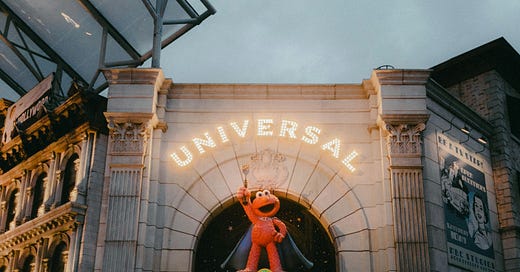A short time ago, Ted Hope threw out a challenge to filmmakers on how they would run a Film Studio. This week, I'd like to throw my hat in the ring.
These are in no particular order, and I haven't read anyone else's. So it's possible these might be repeated.
But here are my 5 ideas on how I would run a film studio.
1. Define Who We Are
What is the difference between a film made by Paramount, Warner Brothers, or Disney? You don't walk into a theater or turn on your TV with any expectations in mind. They are differentiated solely by this:
The IP that they own.
Paramount is mostly Taylor Sheridan dramas, Warner Brothers is still trying to make the DC Universe happen, Disney is Marvel and Star Wars, and Sony are those guys who used to have Spiderman. Overall, it makes them forgettable. There have been times when I forget which company owns what IP if I'm not looking inside the streaming app itself.
But this tells me nothing about the company at large. A24 and Neon have created styles and expectations for the kinds of films they make. So I, as a fictional studio head, would start creating values and expectations on what we do and why we do it. I would define who we are as storytellers and build a reputation off of that.
This would get us out of the IP-chasing game. It would start us on the path of being trendsetters instead of clout chasers.
2. Value Diversity
Let's define diversity in this way:
A wide array of perspectives influenced by different experiences.
We want to bring in people from all walks of life because it keeps us relevant and on our toes. If we all come from similar backgrounds, then we all think the same. There's no one to challenge our perspectives or bring in new information.
In an industry based on storytelling - this is a death sentence.
Audiences are more diverse than ever and want to see themselves reflected on screen. We would bring in people who come from all walks of life and can speak to those audiences.
This would be company-wide.
So not just the creatives, but everyone who works at the studio. We want to cast as wide a net as possible by:
3. Discovery and Training
The studio system has become a moated castle that only a select few are allowed to break into. It needs to evolve.
As this fictional studio head, I would create systems where people can actually learn and improve. Essentially, a system of apprenticeship that gives the people working there a career path.
We would create programs all across the globe to bring in as much talent as possible. Train them up and build them up. People from all kinds of backgrounds and experiences. Building diversity into the foundation of how your company runs and also maintaining it.
We continuously create the next generation of filmmakers. Teaching them not only the craft of filmmaking but also the business of it. How to work together and connect with audiences. We create an environment where you can grow, learn, and experiment.
4. Scale Down and Push Forward
One of the reasons we would get out of the IP-chasing game is this:
It's bloated and expensive.
Too much money is being spent on a few films that are "safe," i.e., pre-existing audiences. But the audiences are bored and want new, original stories.
Original stories are what's safe, so we will get back to that. We create more original films at lower to mid-budget levels. And only a few at the high-budget levels that fit with the type of films that we make. This way, there is room for what's important in any creative pursuit:
Failure.
We don't chase to grow bigger and have the most IP. We create the films that are examples of who we are. We carve our own niche and stay there in a sustainable fashion. And we stay relevant by:
5. Engaging the Community
Studios have become soulless corporations. We would start engaging the community on a personal level again. We would meet them where they are and learn what's important to them. We would try to inspire them and make them think.
To me, that means creating more community events. Create free screenings and sneak peeks with the filmmakers and executives. Engage in conversations online. Make ourselves accessible and human.
We would remind people that what we make is accessible to everyone. And that the audience is what really makes a film part of the general culture. This will make others want to become part of the making of films and TV, which is part of our overall foundation.
WRAPPING UP
Those are 5 things that I would do as head of a studio. These aren't the only things that I would do. I would also work to create an equitable pay and profit-sharing structure. Streamline processes to make the company run smoothly. I'm sure I could think of more, and they are things I'm trying to do with my own company (more on that later).
I hope this inspires some of you to create your own list and keep this challenge going. Maybe we can all combine our ideas to create one big manifesto for the type of environment we want to see.
Film is still the most powerful medium for change. So let's keep working to change it for the better.





This is such sa great solution to the tangled web that the current studio heads have built. It's built on being an expert, not just the owner of product/Inventory. It's built on being an expert at a particular thing. A24 and Neon are great examples of companies who know what they make a ride that fine line between staying in their lane and exploring ways to push the boundaries. Great read!